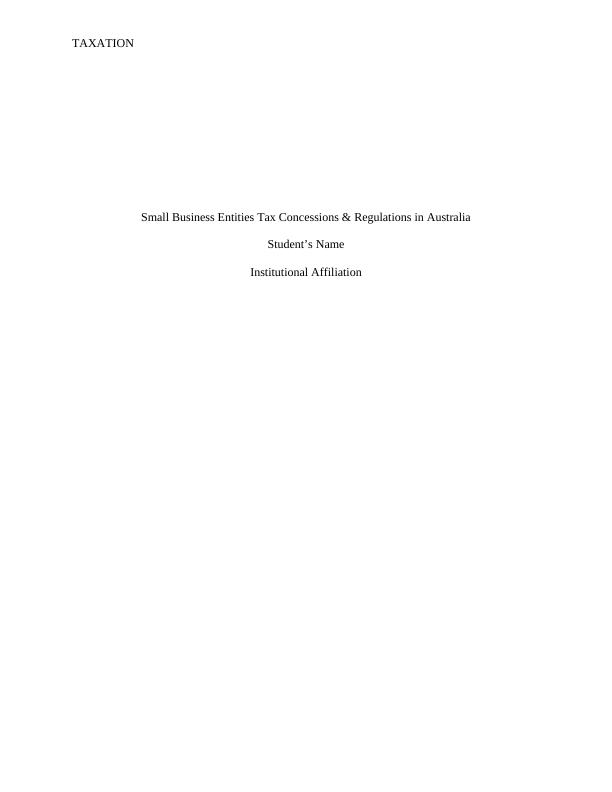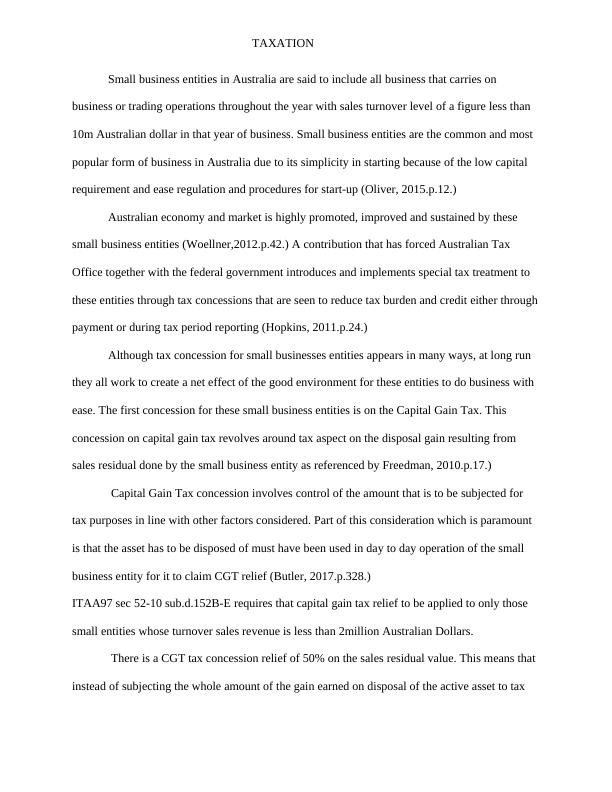Small Business Entities Tax Concessions & Regulations in Australia
Added on 2023-06-11
8 Pages2367 Words164 Views
TAXATION
Small Business Entities Tax Concessions & Regulations in Australia
Student’s Name
Institutional Affiliation
Small Business Entities Tax Concessions & Regulations in Australia
Student’s Name
Institutional Affiliation

TAXATION
Small business entities in Australia are said to include all business that carries on
business or trading operations throughout the year with sales turnover level of a figure less than
10m Australian dollar in that year of business. Small business entities are the common and most
popular form of business in Australia due to its simplicity in starting because of the low capital
requirement and ease regulation and procedures for start-up (Oliver, 2015.p.12.)
Australian economy and market is highly promoted, improved and sustained by these
small business entities (Woellner,2012.p.42.) A contribution that has forced Australian Tax
Office together with the federal government introduces and implements special tax treatment to
these entities through tax concessions that are seen to reduce tax burden and credit either through
payment or during tax period reporting (Hopkins, 2011.p.24.)
Although tax concession for small businesses entities appears in many ways, at long run
they all work to create a net effect of the good environment for these entities to do business with
ease. The first concession for these small business entities is on the Capital Gain Tax. This
concession on capital gain tax revolves around tax aspect on the disposal gain resulting from
sales residual done by the small business entity as referenced by Freedman, 2010.p.17.)
Capital Gain Tax concession involves control of the amount that is to be subjected for
tax purposes in line with other factors considered. Part of this consideration which is paramount
is that the asset has to be disposed of must have been used in day to day operation of the small
business entity for it to claim CGT relief (Butler, 2017.p.328.)
ITAA97 sec 52-10 sub.d.152B-E requires that capital gain tax relief to be applied to only those
small entities whose turnover sales revenue is less than 2million Australian Dollars.
There is a CGT tax concession relief of 50% on the sales residual value. This means that
instead of subjecting the whole amount of the gain earned on disposal of the active asset to tax
Small business entities in Australia are said to include all business that carries on
business or trading operations throughout the year with sales turnover level of a figure less than
10m Australian dollar in that year of business. Small business entities are the common and most
popular form of business in Australia due to its simplicity in starting because of the low capital
requirement and ease regulation and procedures for start-up (Oliver, 2015.p.12.)
Australian economy and market is highly promoted, improved and sustained by these
small business entities (Woellner,2012.p.42.) A contribution that has forced Australian Tax
Office together with the federal government introduces and implements special tax treatment to
these entities through tax concessions that are seen to reduce tax burden and credit either through
payment or during tax period reporting (Hopkins, 2011.p.24.)
Although tax concession for small businesses entities appears in many ways, at long run
they all work to create a net effect of the good environment for these entities to do business with
ease. The first concession for these small business entities is on the Capital Gain Tax. This
concession on capital gain tax revolves around tax aspect on the disposal gain resulting from
sales residual done by the small business entity as referenced by Freedman, 2010.p.17.)
Capital Gain Tax concession involves control of the amount that is to be subjected for
tax purposes in line with other factors considered. Part of this consideration which is paramount
is that the asset has to be disposed of must have been used in day to day operation of the small
business entity for it to claim CGT relief (Butler, 2017.p.328.)
ITAA97 sec 52-10 sub.d.152B-E requires that capital gain tax relief to be applied to only those
small entities whose turnover sales revenue is less than 2million Australian Dollars.
There is a CGT tax concession relief of 50% on the sales residual value. This means that
instead of subjecting the whole amount of the gain earned on disposal of the active asset to tax

TAXATION
only half portion of it is subjected (Evans,2015.P.735.) An illustration on this is if John as small
business entity owner of an active asset machine disposes the asset making a gain of AUD 24520
from it, as a small business entity is allowed to relief the gain amount to 50% of 24520 hence
will only subject AUD of 12260 to capital gain tax and not the full amount of 24520 as is it is
done to those non-special business entities. This 50% exemption ideally increases the income net
returns by half the amount, a plus to the small business entities (Arkwright, 2009.p.81.)
100% tax exemption or a rather full amount exemption of capital gain is another means
of tax relieving the small business entities owners at their retirement age or even at their utmost
level of delivering i.e. incapacitation status. This exemption is applied to assets that have had a
life operation of 15 years and above in the entire entities life. The full amount of gain earned due
to the disposal of the 15year old active asset is free from taxation i.e. the full amount thus
increasing income revenue by 100% i.e. amount exempted (Geljic,2016.P.404.)
Small business entity owners who are at retirement age of 55 years and above are
likewise allowed to enjoy the double benefit, first is the tax exemption part of 100% portion and
secondly is the usage of disposal value as the contribution for superannuation fund account free
from any charge imposition. Small business owners are further allowed to defer tax on capital
gain to a future date an aspect that helps them manage their finances well.
ITAA1997 on division 40 rule as well as sections 328-170-257 of the same act
recommends small business entities asset be depreciated as the single item for tax-deductible
purposes. The regulation further outlines that all assets whose aggregate value amounts to a
figure of 1000 Australian Dollars or more should be treated as the single asset for depreciation
purposes that is deductible for tax purposes. This act of treating assets as single item increases
only half portion of it is subjected (Evans,2015.P.735.) An illustration on this is if John as small
business entity owner of an active asset machine disposes the asset making a gain of AUD 24520
from it, as a small business entity is allowed to relief the gain amount to 50% of 24520 hence
will only subject AUD of 12260 to capital gain tax and not the full amount of 24520 as is it is
done to those non-special business entities. This 50% exemption ideally increases the income net
returns by half the amount, a plus to the small business entities (Arkwright, 2009.p.81.)
100% tax exemption or a rather full amount exemption of capital gain is another means
of tax relieving the small business entities owners at their retirement age or even at their utmost
level of delivering i.e. incapacitation status. This exemption is applied to assets that have had a
life operation of 15 years and above in the entire entities life. The full amount of gain earned due
to the disposal of the 15year old active asset is free from taxation i.e. the full amount thus
increasing income revenue by 100% i.e. amount exempted (Geljic,2016.P.404.)
Small business entity owners who are at retirement age of 55 years and above are
likewise allowed to enjoy the double benefit, first is the tax exemption part of 100% portion and
secondly is the usage of disposal value as the contribution for superannuation fund account free
from any charge imposition. Small business owners are further allowed to defer tax on capital
gain to a future date an aspect that helps them manage their finances well.
ITAA1997 on division 40 rule as well as sections 328-170-257 of the same act
recommends small business entities asset be depreciated as the single item for tax-deductible
purposes. The regulation further outlines that all assets whose aggregate value amounts to a
figure of 1000 Australian Dollars or more should be treated as the single asset for depreciation
purposes that is deductible for tax purposes. This act of treating assets as single item increases

End of preview
Want to access all the pages? Upload your documents or become a member.
Related Documents
Taxation Lawlg...
|6
|731
|86
Taxation Lawlg...
|6
|688
|24
Capital Gain Tax Assignment Solvedlg...
|5
|1035
|34
Assignment On Income Tax Liabilitylg...
|13
|2862
|12
Small Business Tax Concessions - Assignmentlg...
|14
|719
|18
Taxation Case Studylg...
|9
|2564
|266